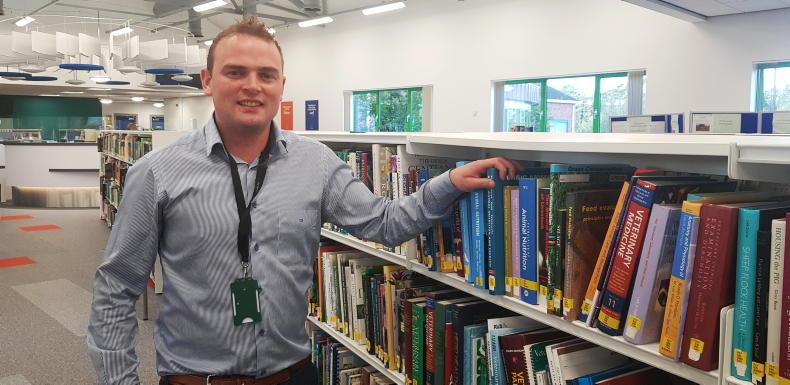Not everyone goes down the typical career route of leaving school, going to college, and then getting a job.
“I went about it a pretty different way,” acknowledges John Fegan, a lecturer at Northern Ireland’s College of Agriculture, Food and Rural Enterprise (CAFRE).
The Co Down man left school when he was 17 and served his time as a bricklayer. This was in 2005 when the building trade was booming.
“After the recession hit, there was a big decline in the building trade. I mainly worked on small constructions like building sheds for local farmers, and then I was working on the home farm too,” he said.

John started working in his current role at CAFRE in 2018.
Home is between Castlewellan and Ballynahinch, where John and his father run a sheep and suckler beef farm.
Pig stockman
In 2010, he got a job as a pig stockman at the Agri Food and Bioscience Institute’s (AFBI) research unit in Hillsborough. “It was good to gain experience in a new farming sector. The role helped expand my skillset,” John said.
After four years at AFBI, he took a career break and went to Australia for a year.
“I was working on a 50,000-beef cattle feedlot in the Riverina Valley in New South Wales. I was on the animal health team which involved working on the quarantine procedure for the 500 cattle that came onto the unit every day. I then did a stint in the building trade in Sydney before coming home in 2015,” he explained.
Part-time study
Although leaving school after GCSE, which is similar to the Junior Cert in the Republic of Ireland, John still studied part-time, albeit reluctantly.
“My mother, who is a teacher, encouraged me do a Higher National Diploma in construction when I was serving my time. That was part of the deal for letting me leave school before finishing my A levels [equivalent of the Leaving Cert],” he said.
John also completed the part-time Level 2 multiskilling course at CAFRE, which included a Level 2 work-based Diploma in Agriculture.

So, by the time he returned from Australia, John had several qualifications under his belt, even though he hadn’t been in full-time education for almost nine years.
For the remainder of his three-year career break from AFBI, John studied a Higher Certificate in Agriculture full-time at Dundalk IT and then went to Harper Adams in England to complete a BSc honours degree.
“When I went out to Harper for the year, I was determined to get the degree and get finished up. There was definitely a drive in me at that time which I didn’t have when I was in my late teens,” John said.
He returned to AFBI Hillsborough for a year before getting his current role at CAFRE when DAERA was recruiting graduate specialist staff in 2018. It took hard work and resolve, but John got there and gained plenty of life experience along the way.
So, what is his advice for someone who is thinking about a career change but needs to go back to education as a mature student?
“Go and do something that you enjoy. It is a lot easier to study something if you are really interested in it. I had practical experience in a number of farming sectors which really helped me when I was studying theory,” John said.
“If you are a bit older, don’t panic. You will take it more seriously and will put in a bigger effort than you would have when you were younger. That is what I found from my experience anyway.” CL
Work-based
learning at
CAFRE
In his current role at CAFRE, John teaches agriculture students who are studying the Level 2,3 and 4 work-based courses.
“The students attend college one day each week and work on farms for the remainder of the week to develop their practical skills and knowledge of running farm enterprises,” John explained.
The work-based courses are delivered across Northern Ireland, including in locations other than CAFRE’s three campuses at Greenmount, Loughry and Enniskillen. Given the restrictions in place this year due to COVID-19, delivery has also been taking place to students remotely.
Agriculture, by its very nature, is a broad subject and the courses at CAFRE reflect that. John gives an example of the Level 3 course where modules range from animal nutrition, to finance, grassland management, health and safety, and livestock breeding.
“It’s a holistic approach. The students get everything that they need to be able to manage a farm,” he said.
“I am teaching various subject areas so it’s interesting and lets me broaden my own knowledge base, as opposed to focusing on one or two specific topics,” John added.
Not everyone goes down the typical career route of leaving school, going to college, and then getting a job.
“I went about it a pretty different way,” acknowledges John Fegan, a lecturer at Northern Ireland’s College of Agriculture, Food and Rural Enterprise (CAFRE).
The Co Down man left school when he was 17 and served his time as a bricklayer. This was in 2005 when the building trade was booming.
“After the recession hit, there was a big decline in the building trade. I mainly worked on small constructions like building sheds for local farmers, and then I was working on the home farm too,” he said.

John started working in his current role at CAFRE in 2018.
Home is between Castlewellan and Ballynahinch, where John and his father run a sheep and suckler beef farm.
Pig stockman
In 2010, he got a job as a pig stockman at the Agri Food and Bioscience Institute’s (AFBI) research unit in Hillsborough. “It was good to gain experience in a new farming sector. The role helped expand my skillset,” John said.
After four years at AFBI, he took a career break and went to Australia for a year.
“I was working on a 50,000-beef cattle feedlot in the Riverina Valley in New South Wales. I was on the animal health team which involved working on the quarantine procedure for the 500 cattle that came onto the unit every day. I then did a stint in the building trade in Sydney before coming home in 2015,” he explained.
Part-time study
Although leaving school after GCSE, which is similar to the Junior Cert in the Republic of Ireland, John still studied part-time, albeit reluctantly.
“My mother, who is a teacher, encouraged me do a Higher National Diploma in construction when I was serving my time. That was part of the deal for letting me leave school before finishing my A levels [equivalent of the Leaving Cert],” he said.
John also completed the part-time Level 2 multiskilling course at CAFRE, which included a Level 2 work-based Diploma in Agriculture.

So, by the time he returned from Australia, John had several qualifications under his belt, even though he hadn’t been in full-time education for almost nine years.
For the remainder of his three-year career break from AFBI, John studied a Higher Certificate in Agriculture full-time at Dundalk IT and then went to Harper Adams in England to complete a BSc honours degree.
“When I went out to Harper for the year, I was determined to get the degree and get finished up. There was definitely a drive in me at that time which I didn’t have when I was in my late teens,” John said.
He returned to AFBI Hillsborough for a year before getting his current role at CAFRE when DAERA was recruiting graduate specialist staff in 2018. It took hard work and resolve, but John got there and gained plenty of life experience along the way.
So, what is his advice for someone who is thinking about a career change but needs to go back to education as a mature student?
“Go and do something that you enjoy. It is a lot easier to study something if you are really interested in it. I had practical experience in a number of farming sectors which really helped me when I was studying theory,” John said.
“If you are a bit older, don’t panic. You will take it more seriously and will put in a bigger effort than you would have when you were younger. That is what I found from my experience anyway.” CL
Work-based
learning at
CAFRE
In his current role at CAFRE, John teaches agriculture students who are studying the Level 2,3 and 4 work-based courses.
“The students attend college one day each week and work on farms for the remainder of the week to develop their practical skills and knowledge of running farm enterprises,” John explained.
The work-based courses are delivered across Northern Ireland, including in locations other than CAFRE’s three campuses at Greenmount, Loughry and Enniskillen. Given the restrictions in place this year due to COVID-19, delivery has also been taking place to students remotely.
Agriculture, by its very nature, is a broad subject and the courses at CAFRE reflect that. John gives an example of the Level 3 course where modules range from animal nutrition, to finance, grassland management, health and safety, and livestock breeding.
“It’s a holistic approach. The students get everything that they need to be able to manage a farm,” he said.
“I am teaching various subject areas so it’s interesting and lets me broaden my own knowledge base, as opposed to focusing on one or two specific topics,” John added.








 This is a subscriber-only article
This is a subscriber-only article










SHARING OPTIONS: